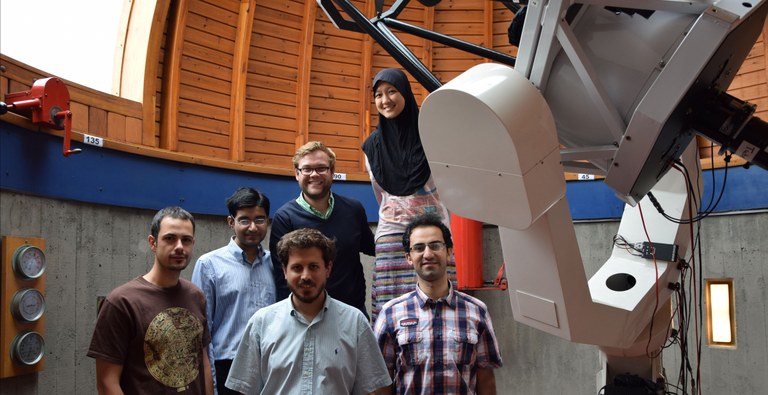Master of Science in Astrophysics
The master’s degree program provides a further research-oriented qualification. The areas of specialization in the degree program at the University of Bonn are aligned with its main fields of research.
The Master’s degree program in Astrophysics
The master’s degree program gives students a comprehensive education in astrophysics and ample scope to set their own priorities.
Students thus learn how to approach complex astrophysical problems and solve them using scientific methods.
The four-semester master’s degree program is taught entirely in English and is divided into one year of courses and another of research.

Elements of the Master’s degree program in Astrophysics
- The compulsory courses in the first two semesters comprise lectures on cosmology, star formation, the physics of the interstellar medium, the astrophysics of galaxies and theoretical astrophysics. Students also carry out a selection of modern (astro-)physics experiments in a lab course and choose additional electives from a wide range of advanced lectures and seminars.
Highlights include the Intensive Weeks, where students spend a few days tackling a research-related topic highly intensively in small groups, experiencing a mixture of lectures and practical assignments.
These are complemented by research-based internships of around four weeks, which give students the opportunity to gain an insight into the activities of the individual working groups even before the actual research phase has begun.
-
The research phase of the master’s degree covers groundwork such as finding a topic for your master’s thesis as well as literature studies and lab work in the third semester and writing your master’s thesis independently in the fourth semester.
During this final year of study, you will form an integral part of one of the many working groups at the University of Bonn or a research institute affiliated with it, such as the Max Planck Institute for Radio Astronomy. This will allow you to make your own creative contribution to current research.
The colloquium on your master’s thesis is an opportunity to present your findings from the research phase in summary form and marks the end of the master’s degree program.
You are likely to be able to continue the work that you began during the research phase as part of a doctorate.
-
Students will need a Bachelor’s degree in Physics or a related subject in order to be admitted to the Master’s degree program in Physics. Specifically, they will need to have obtained 15 ECTS in experimental physics (atomic, solid-state, nuclear and particle physics), 15 ECTS in theoretical physics (quantum mechanics, statistical physics) and 15 ECTS in lab courses.
They will also need evidence of English skills at B1 level. While students who obtain their bachelor’s degree at the University of Bonn will be admitted automatically to the master’s degree program when they receive their bachelor’s certificate, external students will need to apply via the Bonn office of the Bonn-Cologne Graduate School of Physics and Astronomy (BCGS).
Contact
Subject-specific study advisor for astronomy
Senior-Prof. Dr. Peter Schneider
3.003
Auf dem Hügel 71
53121 Bonn